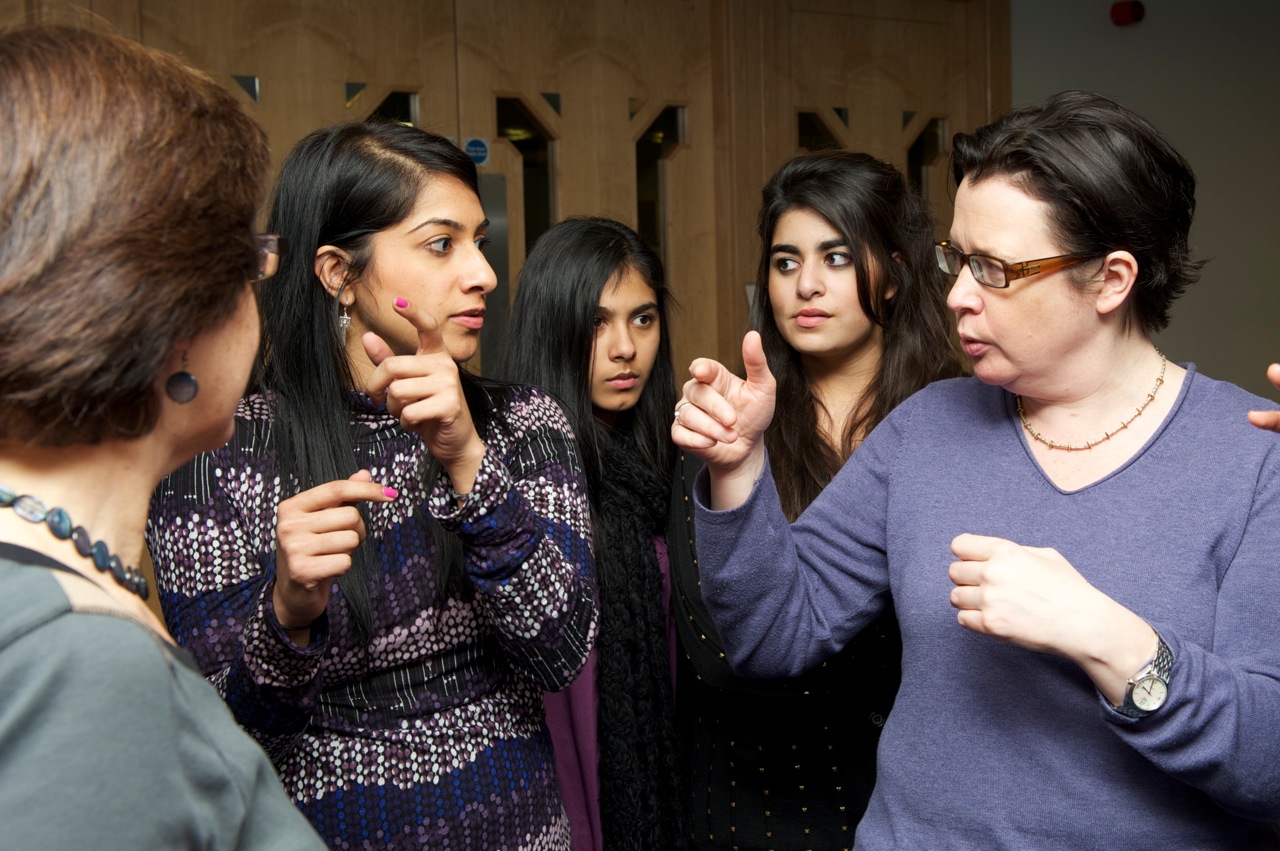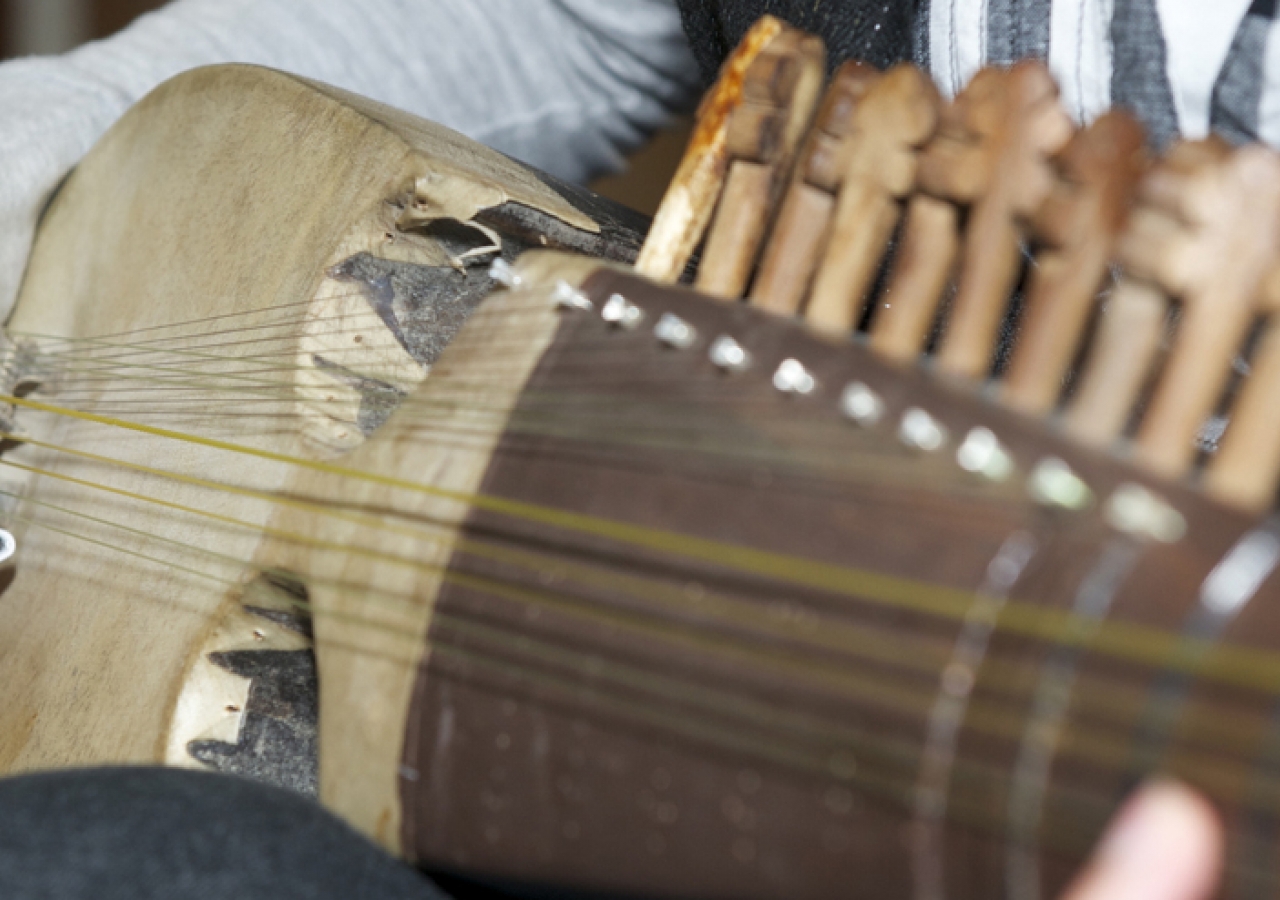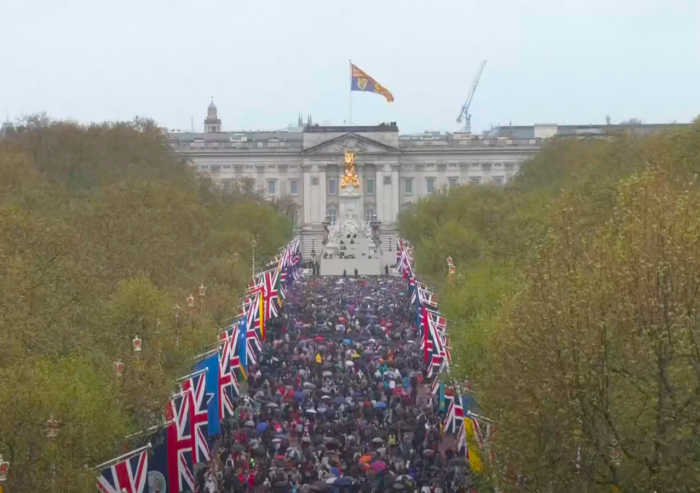 Paul Griffiths making music with the Alim Qasimov Ensemble and the Ismaili Community Ensemble. Naveed Osman
Paul Griffiths making music with the Alim Qasimov Ensemble and the Ismaili Community Ensemble. Naveed OsmanAs the world gets smaller, we are each increasingly touched by peoples of different cultures, traditions and perspectives. Over 14 centuries, the Ismaili Muslim tradition has flourished among the cultures of Central and South Asia, Africa and the Middle East, and spread to Europe, North America, Australia and the Far East. The richness of this diversity, like the pluralism of the ummah as a whole, describes the global Jamat as a beautiful mosaic.
In the United Kingdom Ismaili Community Ensemble (ICE) takes diversity to heart – both in the origins of its musicians and the music that they compose. The Ensemble is well known for its collaborative performances with groups from different countries, faiths and musical traditions. It sees difference as a natural and positive concept.
Making an impact
Established in 2007 to mark the commemoration of Mawlana Hazar Imam's Golden Jubilee, the Ensemble is a success story that, in the past five years, has already made a remarkable impact on the lives of those involved with it. For example, Khalil Osman joined ICE age 12 as a drummer. Now, 16 years old, a large part of his formative years involved music making with the Ensemble.
“I was reluctant to join at first, as it was all quite intimidating,” he recalls. “A lot of the people were older than me.” But joining ICE turned out to be a welcoming experience, and the group bonded quickly during the first few weeks.
“ICE is a constructive way to spend my time. It has taught me teamwork, commitment, music, people skills, performance skills and has been good for self-confidence. It sounds really clichéd but ICE has become a part of my life,” says Osman.
Tanya Sayani was 11 when she joined ICE last year, as a violinist grade 3. In her second year, she is extremely positive about her experience: “It's not a boring orchestra, you're involved in the music making,” she says.
“In the first year, I tried to play as well as I could, other violinists helped me and the musicians from the Royal Philharmonic Orchestra sometimes stayed during lunch break to help me. This year things are a bit easier, I'm not as nervous, I'm more confident.”
Olympic inspiration
In part, that confidence comes from the signature concert that ICE performs each year. As it prepares for its upcoming edition in January 2012, the group has found resonance with the values of the forthcoming London 2012 Olympic Games. Titled Celebrating Diversity, the concert will explore the notion of pluralism in society through the medium of music. Olympic values such as celebrating cultural diversity, inspiring and involving young people, and leaving a positive legacy in London through social cohesion and cultural participation are shared by the Ensemble and have influenced the music it has created for the event.
 The Ismaili Community Ensemble will perform “Celebrating Diversity” at Cadogan Hall in London on Saturday, 28 January 2012. Copyright: Ismaili Community Ensemble UK
The Ismaili Community Ensemble will perform “Celebrating Diversity” at Cadogan Hall in London on Saturday, 28 January 2012. Copyright: Ismaili Community Ensemble UKThis year ICE will collaborate and perform with two very special musical groups, while maintaining and building on its longstanding relationship with the Royal Philharmonic Orchestra. The first collaborator is a group of musicians from the Orpheus Centre, a unique residential performing arts centre. Created in 1998 by popular entertainer Richard Stilgoe, the Centre enables young disabled people to use the performing arts as a vehicle to develop their skills for independent living. Alongside musicians from the Orpheus Centre, ICE musicians will take part in two music making workshops, culminating in a unique musical conversation portrayed both on and off stage.
The second collaborator is a composer, producer and artist; Niraj Chag. He is one of the key modern interpreters of Asian classical and folk styles developing his style over the years whilst working on musicals, scores and dance productions. He has also released two successful albums: Along the Dusty Road and The Lost Souls. He has permitted ICE to adapt one of his tracks and build on it, incorporating his unique style and valuable experience as a professional musician into the Ensemble's music making process.
Ethnomusicology
 Members of Morley College Chamber Choir and vocalists from the Ismaili Community Ensemble exxhange ideas. Naveed Osman
Members of Morley College Chamber Choir and vocalists from the Ismaili Community Ensemble exxhange ideas. Naveed OsmanDr Carolyn Landau is a researcher examining the nature and role of music-making for different Muslim communities in London. A Leverhulme Early Career Fellow in the Department of Music at King's College London, she has been observing the Ismaili Community Ensemble since 2010.
“As an ethnomusicologist, part of what I do is to get involved with the music-making that I'm researching in order to understand as much as possible about all aspects of music-making,” she explains. “So for ICE, this includes how the music is composed, what it's like to be part of ICE at rehearsals and concerts, and what ICE means to its members in the broader context of their everyday lives.”
An oboe player herself, she asked to be part of the Ensemble this year. “I'm beginning to understand how the characteristic ‘ICE sound' is produced – through hard work (as well as lots of fun!) at long rehearsals and with impressive dedication from each member of ICE – and the important role that ICE plays in the lives of its members, musically, socially and spiritually.”
Lens of diversity
 Learning an mentoring are an important part of the Ensemble. Here Ruth Currie from the Royal Philharmonic Ochestra works with Reanna Jamal, an ICE musician. Naveed Osman
Learning an mentoring are an important part of the Ensemble. Here Ruth Currie from the Royal Philharmonic Ochestra works with Reanna Jamal, an ICE musician. Naveed OsmanComplementing the Ensemble's music making, a photographic art initiative was introduced last year. Eleven participants took part in two photography workshops covering technical aspects of using digital SLR cameras, composition skills and introducing photo editing software.
The group included beginners and those with considerable photography expertise. Participants were encouraged to reflect on their personal experiences of diversity in the UK, how they might capture this in a visual image, and what they would like their work to achieve. Finished artwork will be exhibited at the concert venue where ICE will be performing.
The Ismaili Community Ensemble will perform at Cadogan Hall in London on Saturday, 28 January 2012. The photography exhibition will also be on display there, together with the concert.










